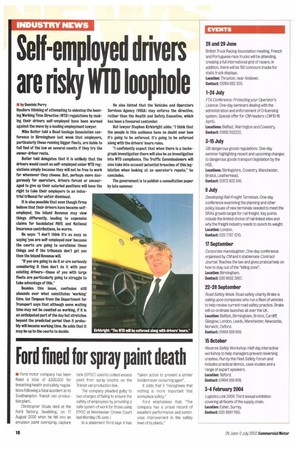Self-employed drivers are risky ED loophole
Page 10

If you've noticed an error in this article please click here to report it so we can fix it.
• by Dominic Perry Hauliers thinking of attempting to sidestep the looming Working Time Directive (MID) regulations by making their drivers self-employed have been warned against the move by a leading employment lawyer.
Mike Butler told a Road haulage Association conference in Birmingham last week that employers, particularly those running bigger fleets. are liable to fall foul of the law on several counts if they try the owner-driver route.
Butler told delegates that it is unlikely that the drivers would count as self-employed under WM regulations simply because they will not be free to work for whomever they choose. But, perhaps more dangerously for operators, drivers forced or encouraged to give up their salaried positions will have the right to take their employers to an industrial tribunal for unfair dismissal.
It is also possible that even though firms believe that their drivers have become selfemployed, the Inland Revenue may view things differently, leading to expensive claims for backdated PAYE and National Insurance contributions, he warns.
He says: "i don't think Its as easy as saying 'you are self-employed now because the courts are going to scrutinise these things and if the tribunals don't get you then the inland Revenue will.
If you are going to do it or are seriously considering it then don't do it with your existing drivers—those of you with large fleets are particularly going to struggle to take advantage of this."
Besides this issue, confusion still abounds over what constitutes 'working' time. Ian Timpson from the Department for Transport says that although some waiting time may not be counted as working, if it is an anticipated part of the day but stretches beyond the predicted period then it probably will become working time. He adds that it may be up to the courts to decide. He also hinted that the Vehicles and Operators Services Agency (VOSA) may enforce the directive, rather than the Health and Safety Executive, which has been a favoured contender.
But lawyer Stephen Kirkbright adds: "I think that the people In this audience have no doubt over how It's going to be enforced. It's going to be enforced along with the drivers' hours rules.
"1 confidently expect that when there is a tachograph investigation there will also be an investigation into WTD compliance. The Traffic Commissioners will also take into account potential breaches of this legislation when looking at an operator's repute," he concludes.
The government is to publish a consultation paper by late summer.




































































































































































